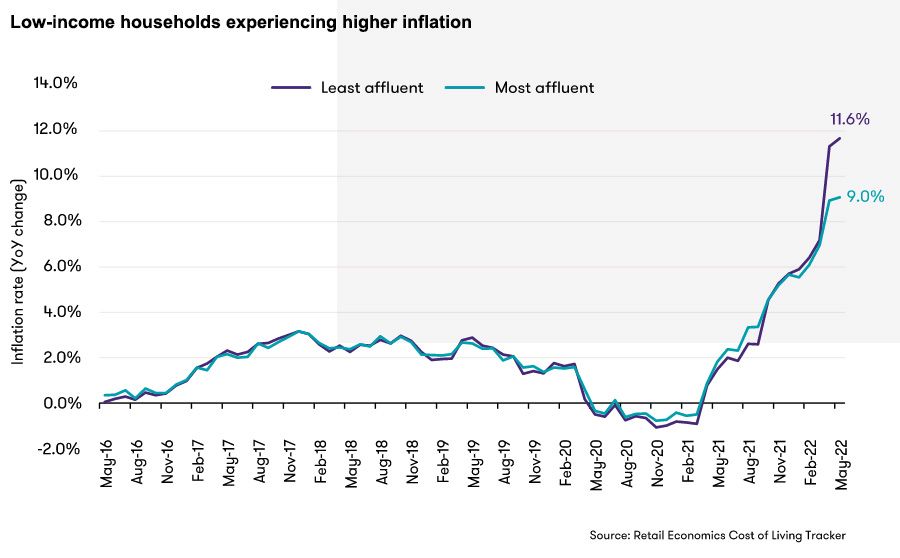Almost nine-in-ten UK consumers intend to cut back their spending over the year ahead, as inflation continues to force them to cut back on non-essential purchases. According to new research, that could cost the economy the best part of £25 billion in discretionary spending.
Consumer spending power in the UK is set to hit a historic low, as employers refuse to raise salaries in line with the country’s record rates of inflation. While pay falls in real terms, rising interest rates mean it is also tougher to borrow to maintain spending, and higher taxes are also hitting household finances. As a result, the squeezed incomes of consumers are seeing households cut back dramatically on all but essential spending.
A report from Grant Thornton shows that of 2,000 adults polled in May 2022, 86% of UK consumers were planning to reduce their spending over the year ahead, as they struggle to cover the spiralling costs of food, fuel and energy bills. A 28% chunk of those plan to do so across every area of spending, while economic modelling within the report suggests this will see the typical UK household cut £887 of its discretionary spend through to April 2023.

Nicola Sartori, Head of M&A Retail and Consumer at Grant Thornton UK, commented, “Retail and consumer-facing businesses are facing significant challenges as surging inflation and geopolitical instability heralds the arrival of the cut back economy. Businesses will need to adapt their propositions to differentiate themselves from the competition and maintain relevancy as a more cost-conscious consumer emerges in this cut back economy.”
Illustrating the gravity of the situation for many retailers, Grant Thornton estimated that the anticipated rate of reduced spending could cost retail and consumer industries £24.9 billion in the current financial year. And with some economists now flagging the potential for 18.6% inflation in 2023, the crisis may well deepen rather than getting better beyond the 12 months of Grant Thornton’s report.
Hitting poorest hardest
In particular, the UK’s least affluent households are set to be hit hardest by inflation – and as such, will need to reduce their proportional spend most drastically. The poorest 20% of UK households – with annual disposable income, after taxation, of less than £15,000 – are already experiencing inflation of almost 12%, compared to around 9% for the wealthiest households. This reflects the disproportionate impact of rising prices across essentials such as food and energy which are seeing some of the fastest price rises.

As such, the least affluent are projected to cut back 9.6% of their annual household spending, compared to 7.6% among the most affluent – where stronger earnings growth has helped offset some of the inflationary pressures and supported discretionary income levels. In between, meanwhile, the average household will cut back on 8.1% of its spend.
At face value, it may appear that the reduction in spending of the wealthiest households is the greater concern for the economy. Although it is a lower portion of earnings, 7.6% accounts for an average sum of £2,654. But the economic activity of this section only accounts for 40% of consumer spending. While that is noticeable, considering the spend only comes from 20% of consumers, the lower amounts of £573 or £1,146 are from consumers who account for 60% of UK spending.
While the most popular method the government is currently touting to solve the cost-of-living crisis is to tax the wealthiest less, then, this would likely fall short of the stimulus needed to avert a deep, long recession. Policies to support the larger portion of the UK’s consumers will need to be realised too.




